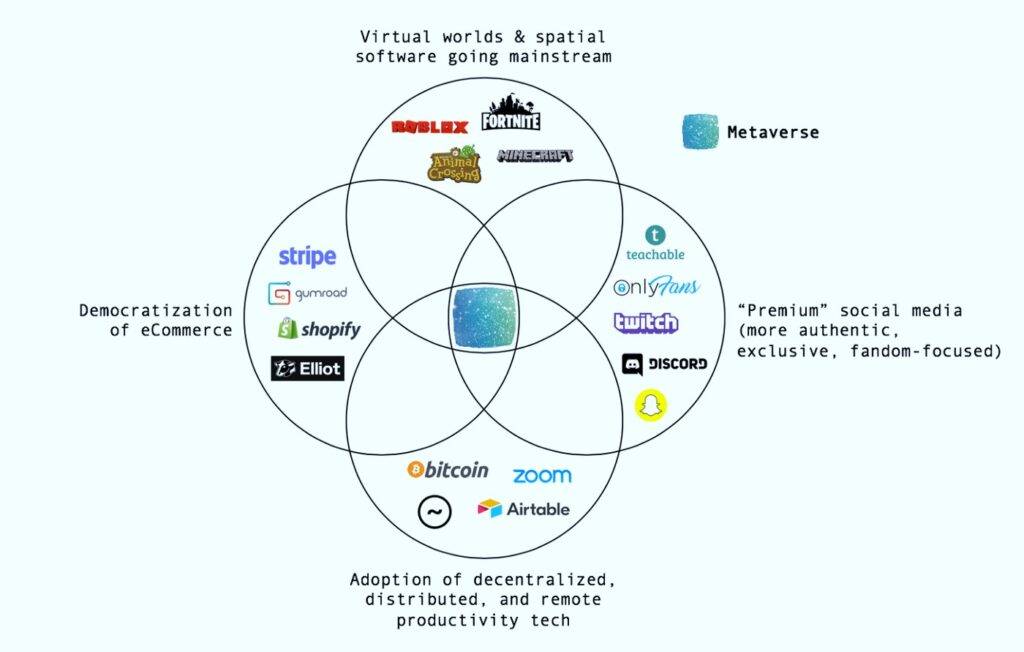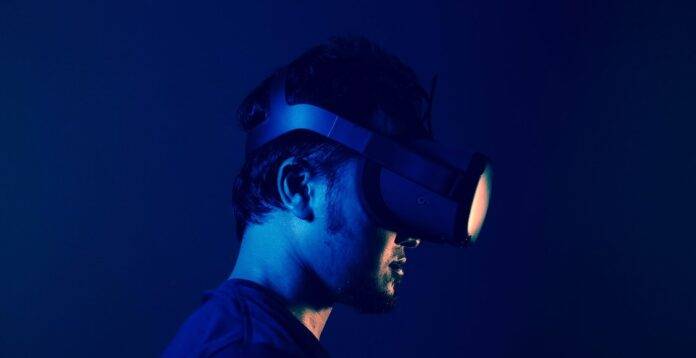Ever since the stone age, humans have been evolving in one way or the other. In the recent past, this wave of evolution is looking stronger than ever. If you look at the major turning points in human history, the invention of the internet happens to be one of the most significant ones. The internet has largely revolutionized humanity which makes us question “what the future holds for us?”. In 1991 for the first time, the word “World Wide Web” was coined which only contained a few sentences on a single page. A couple of years later a video went live on another website, things escalated quickly as you can see. Fast forward a few years later and you have YouTubers having a greater audience than a couple of news outlet giants. Throughout history, technology has made advancements that have given rise to entire new industries and economies. The metaverse is highly anticipated to be that jump in human history.
You would’ve been wondering what’s all this noise about this metaverse has been about? Well, we are here to explain. This first started on 29th November 2021 when Facebook announced that it was going to rename itself as ‘META’. Ever since then, speculations and conspiracy theories have been making rounds on the internet, and likely so. Because of the very limited information we have regarding the metaverse, it makes it obvious for one to speculate. META promises us a digital world powered by Artificial Intelligence, Augmented Reality, and Virtual Reality giving us a life-like experience from the comfort of our homes.
We will discuss the things metaverse has to offer and the threats it poses below.

Metaverse as the name suggests a virtual reality space where users can interact with computer-generated systems and other users. It was also taken as a reference from the book “Snow Crash” written by Sci-fi writer Neal Stephenson. Metaverse is the extension of the internet we use but in a 3-D environment wherein the user is a part of the experience rather than just witnessing the experience on an audio-visual level. As early as its inception has taken place, the metaverse already has numerous takers, the majority of them being high-end gaming companies and tech giants like Microsoft. This alone is enough to indicate that major companies are already adopting the metaverse. The clothing giant H&M recently came up with a virtual store wherein the customers could roam around the store and shop some clothes but just virtually. I can already see the metaverse becoming a hit in the shopping arena as it could save the money being spent by companies on setting up stores, rather than spending the same amount of money on developing high-quality tech infrastructure. We can observe many businesses shift to the Metaverse similar to how businesses started to shift to cyberspace and social media. Virtual Reality is a step up and businesses are preparing to take part.

The metaverse as already mentioned has diverse applications in various fields. So here are some of the few applications of the metaverse which may be of the most significance-
2.1 Businesses :
As businesses continue to offer customers immersive experiences, entering the metaverse will be a no-brainer. With the Metaverse, businesses can explore new opportunities and stay up to date on the latest technologies. NVIDIA has already capitalized on the hype built around the metaverse by creating an Omniverse to connect the worlds within the Metaverse. It allows designers, researchers, and creators to collaborate and sell their products in virtual spaces. As we become more and more immersed in the metaverse, companies will continue getting more of our data which will further help them in making marketing strategies for individuals hence increasing the reach of their business. With the rise of the metaverse, many small companies will also be able to stand at the same level as the relatively larger companies, thus giving an equal playing field to all.
2.2 Economy :
It is almost impossible to imagine the metaverse, the other, just-as-real world, operating without cryptocurrency. In a world where speed, transparency, and security are almost fundamental, crypto becomes a necessity rather than an option. At its heart, cryptocurrency is the perfect medium of exchange for this exponentially emerging hybrid world.
First, prompt, swift, and frequent transactions, like selling your vintage and immediately buying a new one, or even getting your hands on that NFT needs decentralization and transparency, where the power to approve and validate your desirous transactions rests with not just one centralized authority or hub, but rather with every participant in the network collectively, making it more democratic, accessible and quick! You do not repose your trust. Hacks and data breaches occur frequently, but if people are going to be expected to engage in a wholly online and virtual environment, the underlying platform on which they are going to be using needs to be secure. just in a single person.
2.3 Virtual Work Culture :
With the rise of COVID-19, we all have seen how companies and offices quickly adapted themselves to the online hybrid model of work thus saving a lot of money that would’ve been otherwise spent on office maintenance (electricity bills, water bills, housekeeping staff, etc). Now, with the ongoing advent of the metaverse, offices can be built in a virtual set-up where employees can adopt working in a hybrid work-from-home environment. Though this type of working model is economically feasible, it won’t be an easy task to implement taking into account the toll it will take on employees’ mental health. I won’t be surprised if a decade later or so, all offices go virtual
The one thing the metaverse is going to completely revolutionize is the Entertainment industry. Both games and films in the past years have been striving to make the user experience as realistic and engaging as possible. We have all seen 3-D films, have at least heard about a 4-D movie and what it feels like to be in the theatre. By now, the only level we reached by now is giving the movie-goer a life-like experience by making seat movements, usage of surround sound, etc. But shortly, we can experience the films by being in the film itself. I know that it sounds like a scene from a sci-fi movie, but this is what advanced AR and VR do. The concept of cinema halls can also vanish shortly as everyone will have to buy a Meta Occulus to watch a movie.
2.4 Entertainment industry :
Now coming to the gaming industry, gaming with VR is already popular but the gaming quality isn’t great. The overall graphics of a VR game does not even match the video quality of PC games, thus making it an inferior gaming experience. But as time passes, the technology is expected to develop. We have already seen games like Pokemon Go which apply the concept of Augmented Reality(AR) brilliantly to say the least. This game became so popular that it was once considered dangerous for children as it was very addictive and to be honest, a bit risky also. But the future of these games is not far, soon we all will be in a situation which we had only seen in the movies until now.
2.5 HEALTHCARE :
One of the most promising applications of the metaverse lies in healthcare. The healthcare sector will get revolutionized with the advent of the metaverse. Just like many industries are now racing to have a presence in the metaverse, healthcare will be performed in the metaverse as well. It already is. Forms of therapy that take place using virtual reality and augmented reality technologies are all happening in the metaverse. Physical therapy, cognitive therapy, support groups, and rehabilitation have all been taking place in the metaverse even before the term existed.
More recently, Medtronic acquired the company Digital Surgery and Zimmer Biomet announced OptiVu™ Mixed Reality which leverages the Microsoft HoloLens to merge real and virtual worlds. The investments being made by these large med-tech companies, combined with a growing number of startups developing AR and VR solutions, illustrate the way the surgical environment may change in the coming years.
Another example is Beyond Metaverse which brings global healthcare professionals together for simultaneous education, training and planning as well as collaborative medical procedures. According to the company website, it uses advanced cloud and real-time communication technology to “empower clinicians to practice their skills with the utmost precision to ensure everyone receives the best healthcare delivery anytime and anywhere.”
Here are some of the threats we could face in the future:
3.1 Overabundance of access points :
The metaverse will likely require the addition of many new sensors into the home. Each one will monitor users as they browse the virtual world and interact with other avatars. By increasing the surface area of connected devices, users are thus widening the doorway into their network. In other words, they’re adding more avenues that bad actors can take when breaking into the network and stealing information.
3.2 Exploitative data collection :
Biometric information, body language, physical proportions, and social behaviors will likely become a point of targeted advertising in the metaverse. Enabled by the many sensors that monitor those factors, that information could be exploited for hyper-targeted advertising, personalized messaging, or manipulation.
Per CPO Magazine, sensors will provide “unprecedented insight into human biological processes and psychology in real-time.” Those sensors need to be safeguarded against bad actors hoping to take advantage of this sensitive information.
3.3 Subsurface surveillance :
VR-connected devices could become a vacuum of latent data collection. In the same vein as Amazon’s Alexa, AR glasses, cameras, microphones and sensors could become major violations of privacy. Such devices continuously monitor for activation phrases or actions.
But while doing so, they’re also actively storing snippets of information. With unparalleled access inside the home, user information, conversation, and action could be compromised even when users aren’t accessing their devices.
Blackcoffer Insights 38: Sairaj Suryavanshi (RV College of Engineering, Bangalore) & Sakshi Shinde(D.Y. Patil College of Engineering,Akurdi,Pune)



